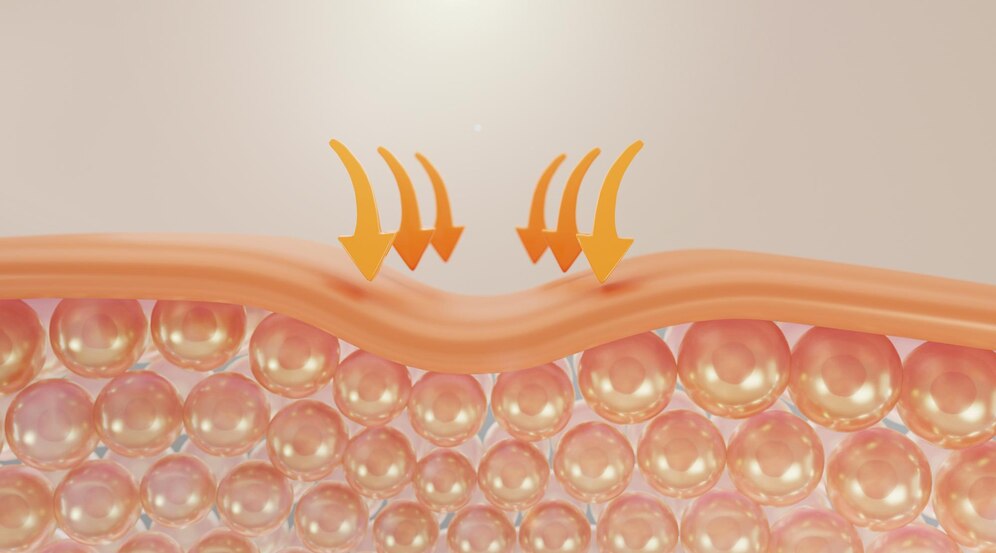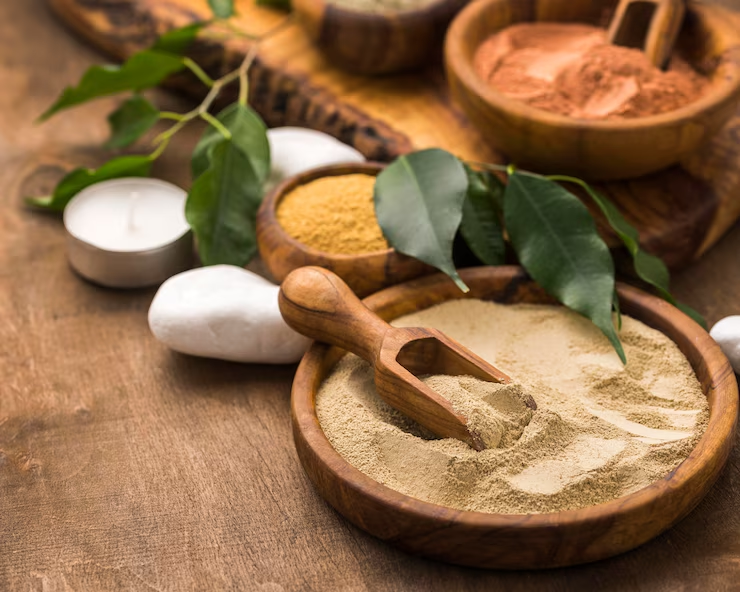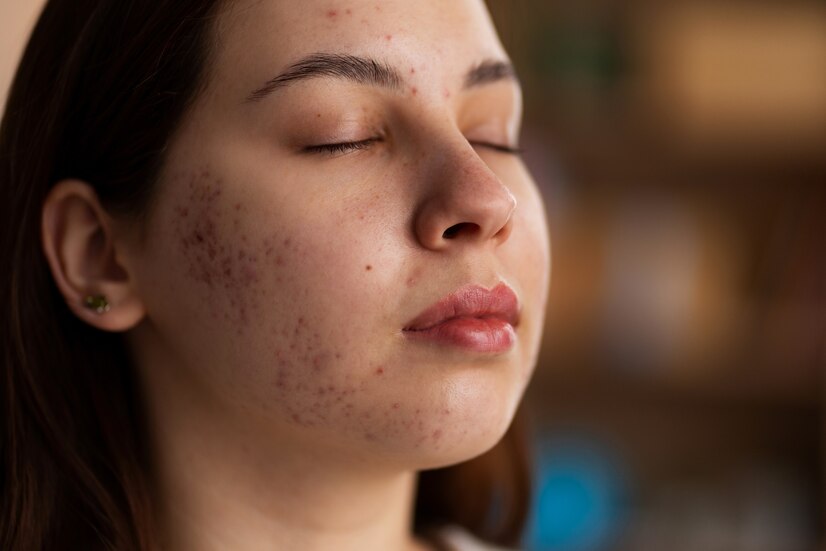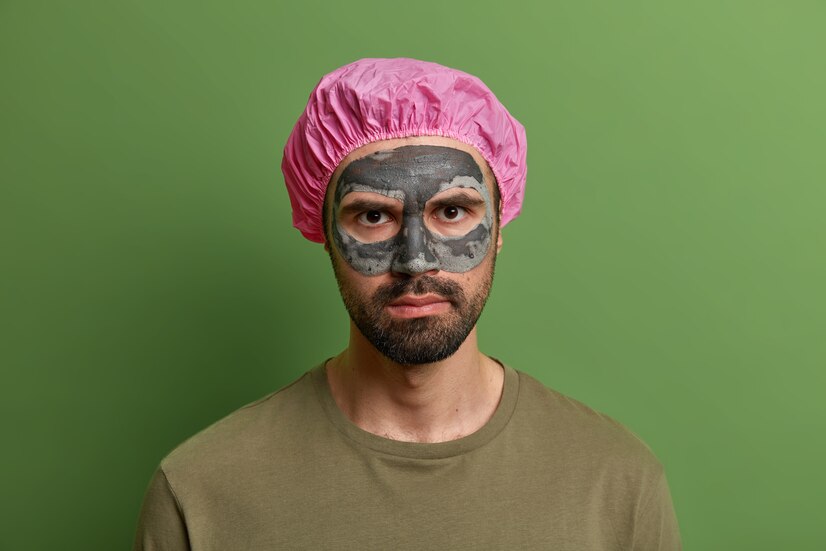DIY ginseng face masks are taking the skincare world by storm, and for good reason! Ginseng, a core ingredient in K-beauty, has been used in traditional Asian medicine for centuries.
This potent herb is known for improving blood circulation, boosting the immune system, and delivering powerful anti-ageing benefits to the skin. While you might not immediately think of ginseng as a skincare essential, it’s a hidden gem in the world of beauty. In particular, red ginseng skincare has earned a reputation for fighting free radicals and calming inflammation, thanks to its rich ginsenosides.
That’s why I was drawn to creating a DIY herbal ginseng skincare mask for my own routine. It’s simple, effective, and harnesses the best of nature for glowing, youthful skin.
Whether you’re looking for a DIY skincare remedy to boost or a deep skin revitalisation treatment, this ginseng mask is the perfect addition to your routine!

Benefits of Ginseng in DIY Face Masks
Ginseng isn’t just a trendy Korean herb — it’s a skincare powerhouse that’s been around for thousands of years! From ancient Chinese medicine to modern Traditional Asian skincare, ginseng’s impact on skin health is undeniable.
Let’s explore the benefits of adding ginseng to your DIY face mask.
Ginseng for Anti-Ageing
When it comes to using ginseng remedies for anti-ageing, its rich ginsenosides for skin improve elasticity and potent antioxidants help combat wrinkles and boost collagen production.
By reducing the breakdown of collagen and elastin, ginseng keeps your skin firm and youthful. Additionally, its anti-inflammatory properties make it a star ingredient in any DIY anti-wrinkle mask, helping to reduce puffiness and irritation.
In fact, a 2017 study suggests that black fermented ginseng has significant anti-wrinkle effects, while another review from the same year indicated that ginseng may help slow the ageing process in the skin.
Packed with antioxidants and anti-inflammatory skincare ingredients, this herb fights off free radicals in skin ageing, promoting a youthful, radiant complexion. Whether you’re battling wrinkles, dryness, or loss of elasticity, a collagen-boosting ginseng mask helps reduce these problems.
Ginseng for Skin Brightening
If you’re looking to brighten or have an even complexion then Ginseng has your back!
This incredible herb, particularly Panax ginseng, works wonders by improving blood circulation and boosting the skin’s overall texture. By enhancing the flow in the skin’s blood vessels, ginseng helps to reduce dark spots and smooth out hyperpigmentation. This means fewer dark patches and a more radiant glow!
When it comes to brightening, Korean red ginseng stands out as one of the most effective ingredients.
Other studies show that fermented ginseng can lighten skin, thanks to its ability to block tyrosinase, the enzyme responsible for melanin production. Even a small study conducted in 2020 found that participants who used a fermented ginseng cream twice daily saw their skin lighten within 8 weeks.
For anyone looking to even out their skin tone and add a bit of radiance, a brightening ginseng face mask is just the thing!

Ginseng for Hyrdation
If you need a hydration boost, Ginseng can be your best fit!
Packed with powerful compounds like ginseng saponins, it helps keep your skin’s water and oil balance in check. This means softer, smoother, and more radiant skin with every use.
Plus, ginseng promotes the production of hyaluronic acid, which is key for keeping skin hydrated and plump. Whether you’re using a DIY ginseng face mask or a sheet mask, or going for a ginseng-infused serum, the end result will be the same — deep hydration and a revitalised complexion.
Ginseng-rich products can also improve your skin’s barrier function, increasing circulation and boosting collagen production. It’s no wonder ginseng is a popular ingredient in revitalising skincare treatments.
This all-natural multitasker gives your skin that dewy, fresh glow, making it perfect for those days when you need an extra shot of moisture — like a ginseng shot for your skin!
Ginseng for Inflammation
If you’re struggling with sensitive, irritated skin, then Ginseng is the gentle solution you need!
Thanks to its powerful anti-inflammatory solution, ginseng helps calm redness, soothe irritation, and even address acne.
The secret lies in its active ingredients, ginsenosides, which work to reduce inflammation by blocking pro-inflammatory enzymes in the skin. This makes ginseng perfect for those with sensitive skin.
This best ginseng face mask can offer relief while also cooling and hydrating the skin. For anyone with sensitive skin, this ginseng mask will just be a game-changer!
Ginseng for Skin Elasticity
If you want to keep your skin firm and youthful using ginseng root powder/ serum can help!
Collagen loss starts in your 20s and 30s, and it’s one of the key reasons skin loses its elasticity. However, ginseng extract for the skin has been shown to slow down collagen breakdown and even boost its production.
Studies have shown the benefits of Korean red ginseng in restoring skin elasticity by supporting collagen synthesis. Another study found that enzyme-treated red ginseng improved elasticity and moisture.
Hence, adding ginseng to your natural skincare routine in the form of ginseng toners or sheet masks—can improve firmness, smooth fine lines, and give your skin a more youthful bounce!

How to Make a DIY Ginseng Face Mask
Looking to bring a natural glow to your skin? Let’s dive into a simple, effective way to make a DIY ginseng face mask right at home.
Ginseng is a key player in Asian beauty rituals, and when combined with other herbal remedies for skin, it becomes a powerful ingredient for your skincare routine.
Here’s an easy homemade ginseng face mask recipe you can whip up in minutes.
You’ll need Panax ginseng powder, lemon, turmeric and magnesium powder to enhance the effects of this ginseng-based skincare treatment.
DIY Ginseng Face Mask Ingredients
- 2 tsp ginseng powder
- 1 tsp ashwagandha powder
- 1 tsp magnesium powder
- ½ teaspoon turmeric
- 1 teaspoon lemon juice or Vitamin C serum

How to Make a Ginseng Herbal Face Mask?
- Mix the Powders: In a small bowl, combine ginseng powder, ashwagandha, and magnesium powder. These form the base of your mask. Ginseng brings anti-ageing benefits, while magnesium powder helps in smoothing and hydrating the skin.
- Add Turmeric: Sprinkle a small amount of turmeric into the mix. Turmeric is packed with anti-inflammatory and brightening properties. It helps fight hyperpigmentation and reduces dark spots, giving your skin an even tone.
- Squeeze in Lemon Juice: Add a dash of lemon juice to the mixture. The lemon juice antioxidants combat free radicals, keeping your complexion fresh and radiant. It also helps lighten dark spots and prevent acne.
- Blend Well: Stir all ingredients together until smooth. If the mixture feels too thick, add a few drops of water or aloe vera gel to achieve the right consistency.
How to Use a Ginseng Face Mask For Skin?
- Apply an even layer of the mask to your cleansed face using your fingertips or a brush.
- Let the mask sit for about 5-10 minutes. While you wait, the ginseng extract for the skin will work its magic, improving circulation and boosting collagen production.
- Rinse off with lukewarm water, and gently pat your face dry with a clean towel.
This herbal remedy for skin not only nourishes but also revitalises tired, dull skin, leaving you with a naturally glowing complexion. This adaptogen for skincare offers a quick way to bring the beauty benefits of ginseng right to your home!
How Long Does It Take to See the Effects of Ginseng?
If you’re wondering about the skin benefits of ginseng, here’s the scoop!
Many people notice visible changes in their skin within just a few weeks of using ginseng regularly. However, everyone’s skin is unique, and some may experience results even sooner, depending on the specific product and their skin type. For significant improvements in skin texture and elasticity, consistent use over a longer period is often key.
A study showed that participants who applied ginseng cream twice daily saw their skin lighten after just 8 weeks. So, stick with it and enjoy the journey to see radiant skin with these homemade beauty solutions!

How Often Should You Use a Ginseng Mask?
For optimal results, you should use a ginseng mask 1–3 times a week based on your skin type and the ingredients.
If you have normal to oily skin, applying it twice a week after your serum works well. Those with normal to dry skin may prefer less frequent use.
Adopting these practices will help you reap the most benefits from these herbal masks and adhere to Korean beauty standards, thus promoting glowing skin!
DIY Ginseng Mask Recipes for Different Skin Concerns
Creating your own DIY herbal ginseng mask recipes can address various skin concerns effectively! Here are some tailored recipes to try at home:
For Dry Skin: Ginseng, Honey, and Aloe Vera
Combine ginseng powder with honey and aloe vera for a hydrating mask. Honey locks in moisture while aloe vera soothes and nourishes your skin. This Ginseng face mask for dry skin can help combat flakiness and give you a soft, supple texture.
For Oily Skin: Ginseng, Bentonite Clay, and Tea Tree Oil
Mix ginseng with bentonite clay and a few drops of tea tree oil for a powerful ginseng mask for oily skin. Bentonite clay absorbs excess oil and impurities, while tea tree oil has natural antibacterial properties that can help reduce breakouts.
For Acne-Prone Skin: Ginseng, Green Tea, and Turmeric
For those with blemish-prone skin, a mask of ginseng, green tea, and turmeric is a great option. Green tea helps reduce inflammation, and turmeric has anti-inflammatory properties, making this a perfect ginseng mask for acne-prone skin.
For Brightening Dull Skin: Ginseng, Lemon Juice, and Yogurt
To bring back your skin’s glow, combine ginseng with lemon juice and yoghurt. The vitamin C in lemon brightens dark spots, while yoghurt hydrates and exfoliates. This recipe serves as a ginseng face mask for dull skin that refreshes your complexion.
It is advised to adjust the quantities of these based on your skin’s needs to get the best results! Experimenting with these herbal facial mask recipes can make your DIY skincare products fun and effective!
The Science Behind Ginseng in Skincare
Ginseng has made waves in the beauty world since the 1980s, and for good reason! This remarkable root, known scientifically as Panax, which means “treat all” in Greek, is packed with benefits for your skin. Now let’s understand the science behind this amazing Korean root:
Ginseng and Ginsenoside
Its key ingredient, ginsenosides, plays a vital role in natural anti-ageing treatments. Research shows that ginseng extract can significantly reduce facial wrinkles. It also stimulates collagen production, which is crucial for maintaining skin elasticity and preventing signs of ageing.

Ginseng and Free Radicals
But that’s not all! Ginseng also combats free radicals, helping to shield your skin from UV damage and photoageing. By regulating collagen and elastin breakdown, it supports a firmer, more youthful complexion. Plus, ginseng’s anti-inflammatory properties make it an excellent choice for those struggling with redness or acne.
DIY ginseng face mask is the perfect ginseng-based skincare treatment you can give your skin!
By adding this mask to your routine, you’re not just pampering yourself; you’re investing in long-term transformation for your skin.
Also Read: DIY 10-Step Korean Skincare Routine
Can Ginseng Be Absorbed Through the Skin?
Yes, ginseng can be absorbed through the skin, making it a powerful addition to your skincare routine. Studies show that ginseng extracts penetrate the skin, bringing their anti-ageing and soothing properties with them.
Whether you use a red ginseng skincare product like a serum or a ginseng-infused toner, the skin can absorb its active compounds—called ginsenosides—effectively.
These compounds are rich in antioxidants and anti-inflammatory benefits, helping calm the skin and reduce irritation.
You’ll find ginseng in a wide range of products like eye creams, face washes, day creams, and more, all helping to rejuvenate and protect your skin at different stages of your routine.
Is a Ginseng Mask Good for the Skin?
Yes! A ginseng mask offers multiple benefits.
- For starters, ginseng’s anti-ageing properties help reduce wrinkles and fine lines, making your skin appear younger.
- Its brightening effects can even out your skin tone, giving you a radiant glow.
- Ginseng also supports collagen production, which firms up the skin and improves elasticity.
- Additionally, it’s loaded with antioxidants that fight free radicals, helping to reduce inflammation.
- Lastly, a DIY ginseng face mask strengthens your skin’s protective barrier, keeping it hydrated and shielding it from environmental damage.
How to Incorporate Ginseng into My Skincare Routine
Ginseng is a powerful skincare ingredient that can boost your routine with its rejuvenating benefits. Let’s dive into how you can seamlessly add it to your daily regimen!
Best Time to Apply a Ginseng Face Mask
For the best results, apply a hydrating ginseng face mask at night. This allows the nourishing properties of ginseng to work their magic while your skin repairs itself. If you’re aiming for a fresh morning glow, try using a ginseng-infused serum in your morning routine for a lighter, radiant finish.

Pairing Ginseng with Other Products
- Ginseng & Hyaluronic Acid Serum: These two are hydration powerhouses! Together, they can boost moisture levels and plump up the skin, reducing the appearance of fine lines.
- Ginseng & Vitamin C Serum: Add a DIY face mask with clay, ginseng, and Vitamin C to brighten your complexion, protect against UV damage, and improve elasticity.
- Ginseng & Peptides Creams: This combo enhances collagen production, making it the perfect mask for anti-ageing and firmer skin.
- Ginseng & Green Tea Extract: Both rich in antioxidants, these ingredients can help fight free radicals and UV damage, perfect for a ginseng and green tea mask.
Incorporating ginseng with other products, such as toners, serums, or creams, can truly elevate your skincare routine with ginseng for healthier, glowing skin!
Also Read: Viral DIY Rice Water as a Toner
Ginseng vs. Other Popular Skincare Ingredients
Ginseng is a powerful ingredient that can be used for various skin concerns. However, there are market alternatives that can provide better or similar benefits as ginseng. Let’s understand how these alternatives compare with ginseng:
Ginseng vs. Green Tea: Which Is Better for Skin?
When comparing ginseng and green tea for skin health, each offers unique benefits.
Green tea is often favoured for its research-backed ability to combat acne, inflammation, and oxidative stress, making it great for sensitive or acne-prone skin.
However, ginseng is known for its anti-ageing treatments. It boosts skin elasticity, improves blood circulation, and helps reduce the appearance of fine lines and wrinkles.
Ultimately, both can be effective, but if you’re looking for anti-ageing benefits, a Korean ginseng face mask may be your go-to choice.
Ginseng Vs. Retinol for Anti-ageing
Both ginseng and retinol have significant anti-ageing benefits.
Retinol, a form of Vitamin A, is renowned for smoothing wrinkles and stimulating collagen production. However, it can make skin more sensitive to the sun, which is why it’s recommended for evening use.
Ginseng, on the other hand, can be used any time of day and is gentle enough for the eye area. It calms the skin while delivering antioxidants and collagen-boosting properties, making it a great partner to retinol in a balanced routine.

Ginseng Vs. Vitamin C for Skin Brightening
Both ginseng and Vitamin C are excellent for brightening skin, but they target different concerns.
Ginseng enhances skin tone, improves skin texture, and reduces melanin production, helping with signs of ageing and dullness.
Vitamin C is a powerhouse antioxidant that brightens the skin, fights UV damage, and boosts collagen formation. You can use them together in your routine for maximum skin rejuvenation.
Why Ginseng is a Superior Adaptogen for Skin
Ginseng is considered one of the most powerful adaptogens, earning the title “The King of Adaptogens.”
Adaptogens are natural substances that help the body resist physical, environmental, and emotional stress. For the skin, ginseng works by enhancing your skin’s ability to adapt to stressors, such as pollution and free radicals. These harmful particles can accelerate ageing, but ginseng’s antioxidant properties help neutralise them.
Ginseng also boosts circulation, which helps with overall skin health and radiance. Its ability to balance and adapt to different skin needs makes it an ideal ingredient in herbal remedies for the skin.
Common Mistakes When Making a DIY Ginseng Face Mask
Creating a DIY ginseng mask can be exciting, but some common mistakes could reduce its effectiveness—or worse, irritate your skin. Here are a few to watch out for:
Leaving Mask on Too Long
Many people think leaving a mask on for longer gives better results. But, leaving a mask for more than 10 to 30 minutes can cause issues like irritant dermatitis.
Masks, especially those with cleansing properties, may contain ingredients that strip oils from your skin. Ginseng masks should be kept for 10-30 minutes max, to avoid any irritation.
Skipping Double Cleansing
Before applying your ginseng face mask, make sure to cleanse your skin properly. Leftover oil, makeup, or sunscreen can block the mask’s absorption. Clean skin ensures that ingredients like ginseng root powder work more effectively, giving you that glow without any hindrance.

Wrong Ingredients for Your Skin Type
It’s crucial to choose ingredients that match your skin’s needs. For example, clay works best for oily skin, while a ginseng mask for dry skin can be more hydrating when combined with aloe vera or honey.
If you have acne-prone skin, pair ginseng with turmeric or green tea for soothing benefits.
Not Changing Mask Recipe For the Seasons
Your skin’s needs change with the seasons. In winter, opt for hydrating masks that replenish moisture. During the summer, a lighter, ginseng and clay mask can help with oil control.
Not Moisturising Enough
Always follow up your DIY ginseng mask with a good moisturiser. This seals in the benefits and keeps your skin hydrated, reducing the chances of dryness.
Not Storing Properly
DIY ginseng face masks should be stored in airtight containers and kept in the fridge. This helps preserve the active ingredients, ensuring your mask stays effective for a longer time.
It is advised to always check for its freshness before applying.

Conclusion
Incorporating a DIY ginseng face mask into your skincare routine can offer numerous benefits, from anti-ageing properties to improved skin elasticity. Whether you’re looking for hydration or a natural glow, natural skincare with ginseng can be a powerful addition to your regimen. Explore the best ginseng face mask recipes and experiment to find what works best for your skin type.
For more herbal beauty remedies and skincare tips, check out my DIY skincare blog for easy-to-make recipes and holistic beauty care ideas.
Start your journey toward healthier skin today!
FAQ’s
Ans- Red ginseng is considered the best option for a face mask due to its antioxidant-rich and anti-inflammatory properties. It boosts collagen production and has the most research supporting its skin benefits.
Ans- A red ginseng face mask delivers powerful skin benefits thanks to its high concentration of ginsenosides. These active compounds help reduce inflammation, improve collagen production, and offer strong antioxidant protection, leaving the skin firmer and more radiant.
Ans- No, Koreans don’t use ginseng as a replacement for Vitamin C. Both ginseng and Vitamin C are popular ingredients in Korean skincare. It’s a myth pushed by marketing, but in reality, both are used together for healthy, glowing skin.
Ans- Both ginseng and retinol are great for anti-ageing but work differently. While retinol focuses on cell turnover and smoothing wrinkles, ginseng is soothing, anti-inflammatory, and can boost collagen. You can use them separately or together, depending on your skin’s needs
Ans- The main side effect of ginseng on the skin is the potential for allergic reactions, like rash, itching, or swelling. These side effects typically only affect those with ginseng allergies. Always patch test before applying.



